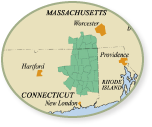
For a Touch of Sweetness, Visit Your Local Beekeeper
“The only reason for making a buzzing-noise that I know of is because you’re a bee…The only reason for being a bee that I know of is making honey….and the only reason for making honey is so I can eat it.”
Winnie the Pooh in A.A. Milne’s The House at Pooh Corner
For the past few years, I have used honey as my preferred sweetener. From coffee and tea to toast and yogurt, it is a touch of honey that I use. Part of my reasoning is trying to maintain a healthy diet by avoiding processed foods and refined sugars. Of course, it also tastes great. Another important part of my honey habit is purchasing honey made at local apiaries from our region’s many farmers markets, specialty stores and farm stands.
The Connecticut Agriculture Experiment Station keeps a list of beekeepers in each town in the state. The most recent list from 2016 shows more than 80 registered beekeepers in the 26 Connecticut towns within The Last Green Valley National Heritage Corridor. Many of the registered beekeepers have only a few hives for personal use, but some keep hundreds. One apiary from which I frequently purchase honey keeps more than 500 hives in Eastern Connecticut. Their hives are spread throughout the region at orchards and vegetable farms where pollination by the bees is critical to the success of the annual crop.
I prefer to purchase unfiltered and non-pasteurized honey because it still has its natural enzymes and, if possible, to purchase darker honey, which is usually produced later in the season. Darker honey is typically high in antioxidants, as well as vitamins and minerals. A large jar of honey usually lasts me a few months.
There are many amazing facts about honey, including that it never spoils, and any bacterial growth is inhibited due to its low moisture level. You don’t need to refrigerate honey, and I keep it on my kitchen counter ready to use when called for.
There are many sources of information about honey and beekeeping. Regionally, the Connecticut Beekeepers Association website at http://ctbees.org is a good resource for those interested in learning more about keeping bees. Their stated purpose is to increase public awareness of the importance of honey bees for Connecticut agriculture and the environment and support beekeepers and their local organizations.
Another good source of information is the Eastern Connecticut Beekeepers Association. They are an organization for beekeeping hobbyists and enthusiasts. You can check out their website at https://www.myecba.org.
If you’ve ever thought of keeping bees, the ECBA offers classes through its Bee School. The association’s website has the schedule for programs on beekeeping. Their website also has very helpful links with information about getting started with bees, as well as links to other state and regional organizations.
Another statewide organization is the Back Yard Beekeepers Association based in Southwestern Connecticut. There is a fascinating section of their website “About Honeybees” filled with facts. Here is a sampling from their website:
Honeybees are not native to the US. They are European in origin and were brought to North America by early settlers. They are not aggressive by nature and will not sting unless protecting their hive from an intruder or are unduly provoked.
Honeybees represent a highly organized society, with various bees having very specific roles during their lifetime: nurses, guards, grocers, housekeepers, construction workers, royal attendants, undertakers, foragers, etc. The queen bee can live for several years. Worker bees live for six weeks during the busy summer, and four to nine months during the winter.
Agriculture depends greatly on the honeybee for pollination. Honeybees account for 80 percent of all insect pollination. Without such pollination, we would see a significant decrease in the yield of fruits and vegetables.
Honey is used by the bees for food all year. There are many types, colors and flavors of honey, depending on its nectar source. The bees make honey from the nectar they collect from flowering trees and plants. Honey is an easily digestible, pure food. Honey is hydroscopic and has antibacterial qualities. Eating local honey can fend off allergies.
There is only one queen per hive. The queen is the only bee with fully developed ovaries. A queen bee can live for three to five years. The queen mates only once with several drones, and will remain fertile for life. She lays up to 2,000 eggs per day. Fertilized eggs become female worker bees and unfertilized eggs become male drones.
All worker bees are female, but they are not able to reproduce. Nearly all of the bees in a hive are worker bees. The worker bees sequentially take on a series of specific chores during their lifetime: housekeeper, nursemaid, construction worker, grocer, undertaker, guard and finally, after 21 days, they become a forager collecting pollen and nectar.
The drone bees are all males and are kept on standby during the summer for mating with a virgin queen. Because the drone has a barbed sex organ, mating is followed by death of the drone. There are only 300-3,000 drones in a hive. The drone does not have a stinger. Because they are of no use in the winter, drones are expelled from the hive in the autumn.
The greatest threat to beekeeping is two varieties of mites (Varroa and Tracheal). And, although these mites can be kept under control by a persistent beekeeper, the negative effects on the honeybee population has been devastating.
Beekeepers are on the watch for various diseases unique to honeybees and harmless to humans. Foul Brood and Nosema are two such diseases. These problems can easily be addressed by good management and proper medication.
One of the best ways to learn about honey and beekeeping is to speak with the people who keep bees and produce honey for sale. A visit to your local farmers market is a good way to meet a beekeeper from your area.
The agricultural fairs in our region are another great way to learn more about beekeeping. Every fair I have attended has a booth devoted to beekeeping. Frequently, they’ll have a live hive on display (behind protective glass), plenty of literature and lots of honey and bee products for sale. Each year I attend the Lebanon, Brooklyn and Woodstock fairs and usually come home with a jar of honey. Both the Brooklyn and Woodstock fairs have large exhibits operated and maintained by the Eastern Connecticut Beekeepers Association.
We live in a beautiful region rich in agricultural heritage and local farm products available for our daily consumption. The sweetest of all is the honey produced by beekeepers right here in The Last Green Valley. I hope you’ll join me in the satisfying taste of local honey.
Get Connected
Sign up for our newsletter
"*" indicates required fields



